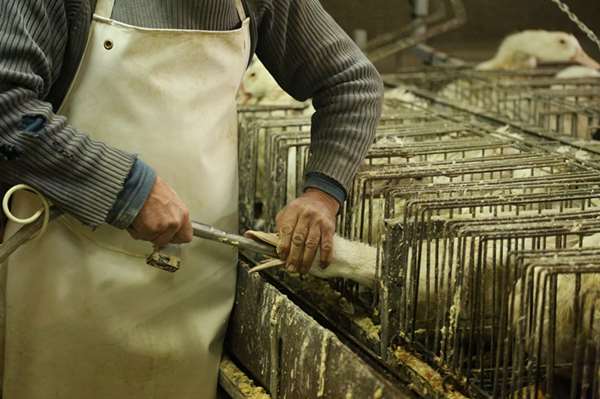The foie gras police are back on the job, patrolling the poultry farms of the Golden State in search of mistreated ducks and geese. Recently, California’s Ninth Circuit reinstituted the ban on foie gras production which had been temporarily overturned by a 2015 federal court decision.
The law in question is California S.B. 1520, which prohibits the force feeding of a bird “for purposes of enlarging the bird’s liver beyond it’s normal size.” It originally went into effect on July 1, 2012, supported by a coalition of animal rights organizations. It was found to be unlawful in January 2015, and reversed on appeal on September 15.
For those who live outside the fine dining universe, foie gras (which translates as “fat liver”) is the French technique of forcing a feeding tube down the throat of a duck or goose, in a process known as gavage. Opponents of the practice also object that the birds are confined to a cage that restricts movement. Ironically, it may not even necessary to do this: some evidence suggests that free-range ducks and geese, given an endless food supply, may overeat to the point where their livers become distended anyway.
Even so, the traditional French technique was transplanted to the U.S. and widely used to support the production of foie gras when its consumption became chic and trendy. Chefs who oppose the ban maintain that the birds’ esophagus is more flexible than that of humans, and that no cruelty is involved. The law posed a difficult situation for producers in both the Sonoma and Hudson Valleys, as well as restaurants catering to an upscale clientele.
If you pull back for a moment and look at the situation unemotionally, you’d question why animal rights activists are so focused on this. Almost everyone knows that slaughterhouse conditions are horrific, that livestock and poultry are subjected to widespread tortures before their death. We also know that upscale steak houses have experienced exponential growth over the past few decades. So why are we so upset about foie gras?
The simple answer could be it’s a fight that activists can win: it’s far easier to take away someone’s foie gras than it is to deprive them of their $70 porterhouse. Focusing on foie gras is symbolic, a method of suggesting that animals are being tortured for the pleasure of the rich (even though far more diners are consuming that $70 porterhouse every day, washed down by a bottle of $200 California Cabernet). Obviously, everyone must decide where they come to rest on the food chain. The inconvenient truth of this situation is that if you choose to eat meat, you’re probably ingesting the flesh of an animal that has been tortured. Protecting an overfed duck or goose may make you feel better.
Mark Spivak is the author of Iconic Spirits: An Intoxicating History (Lyons Press, 2012) and Moonshine Nation (Lyons Press, 2014); his first novel, Friend of the Devil, is now available from Black Opal Books. For more information, go to amazon.com.
The post Return of the Foie Gras Police appeared first on Palm Beach Illustrated.


